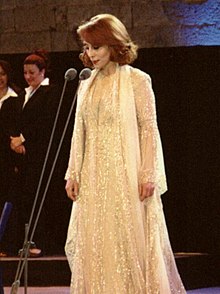
Back فيروز (مغنية) Arabic فيروز (مغنيه) ARZ Feyruz Azerbaijani فیروز (شارکیچی) AZB Fairuz BAN Фейруз Bulgarian Fairuz BS Fairuz Catalan فەیرووز CKB Fajrúz Czech
Fairuz فيروز | |
|---|---|
 Fairuz in 2001 | |
| Born | Nouhad Wadie Haddad (نهاد وديع حداد) November 21, 1934 Zuqaq al-Blat, Beirut, Lebanon |
| Occupations |
|
| Spouse | |
| Children | 4 (Ziad, Layal, Hali and Rima) |
| Musical career | |
| Also known as | Fairuz (فيروز) |
| Genres | |
| Instrument(s) | Vocals |
| Discography | Fairuz discography |
| Years active | 1950–present |
| Labels | |
| Website | fairouz |
Nouhad Wadie Haddad (Arabic: نهاد وديع حداد, romanized: Nuhād Wadīʿ Ḥaddād, Lebanese Arabic pronunciation: [nʊˈhaːd waˈdiːʕ ħadˈdaːd]; born November 21, 1934[1][2][3][4]), known as Fairuz (Arabic: فيروز, romanized: Fayrūz, pronounced [fajˈruːz]),[a] is a Lebanese singer. She is widely considered an iconic vocalist and one of the most celebrated singers in the history of the Arab world. She is popularly known as "The Bird Of The East," "The Cedar Of Lebanon," "The Moon's Neighbor", and “The Voice Of Lebanon”, among others.[5][6][7][8][9][10]
Fairuz began her musical career as a teenager at the national radio station in Lebanon in the late 1940s as a chorus member.[11] Her first major hit, "Itab", was released in 1952 and made her an instant star in the Arab world.[12] In the summer of 1957, Fairuz held her first live performance at the Baalbeck International Festival where she was awarded with the honor of "Cavalier", the highest medal for artistic achievement by Lebanese president Camille Chamoun.[13][14] Fairuz's fame spread throughout the Arab world in the 1950s and 1960s, leading her to perform outside of Lebanon in various Arab capitals, including Damascus, Amman, Cairo, Rabat, Algiers, and Tunis.
Fairuz has received multiple awards and tokens of recognition throughout her career, including the Key to the Holy City awarded by the Jerusalem Cultural Committee, the Jordanian Medal of Honor presented by King Hussein of Jordan, the French Commandeur des Arts et des Lettres, and the Chevalier de la Légion d'honneur, the Highest Artistic Distinction, awarded by Tunisian President Zine El Abidine Ben Ali.[12] Throughout her career, she headlined at the most important venues in the world, such as Albert Hall and Royal Festival Hall in London, Carnegie Hall, Lincoln Center and United Nations General Assembly Lobby in New York, the Olympia and Salle Pleyel in Paris, and the Odeon of Herodes Atticus in Athens.[15]
In a career spanning over six decades, Fairuz has recorded nearly 1500 songs, released more than 80 albums, performed in 20 musicals, and sold over 150 million records worldwide, making her one of the highest selling Middle-Eastern artists of all time, and one of the best-selling music artists in the world.[16][17][18][19][20]
- ^ "Fairuz | Biography & History | AllMusic". AllMusic. Retrieved November 21, 2017.
- ^ "Aljazeera - فيروز من "جوار القمر" إلى عمق التاريخ" (in Arabic). Retrieved November 21, 2017.
- ^ "المطربة فيروز". Mbc3.mbc.net (in Arabic). Archived from the original on October 29, 2018. Retrieved November 21, 2017.
- ^ "في مثل هذا اليوم ولدت المغنية اللبنانية نهاد وديع "فيروزnohad hadda"". Zaytoday.com. Archived from the original on April 4, 2019. Retrieved November 21, 2017.
- ^ Nora Boustany (April 26, 1987). "The Sad Voice of Beirut". The Washington Post.
- ^ "Fans lend their voices to Fairouz, the silenced diva". the Guardian. July 29, 2010.
- ^ "Lebanese diva Fairuz's concert delights Syrian fans". Agence France-Presse. January 28, 2009. Archived from the original on July 7, 2009. Retrieved September 28, 2009.
- ^ Khaled Yacoub (January 28, 2008). "Lebanese diva arouses emotion, controversy in Syria". Reuters. Retrieved September 28, 2009.
- ^ Fayrouz.. 80 years of singing “Heaven’s Harp” (in Arabic)
- ^ "Virtually Unknown in the West, But She's an Icon of the Arab World". Messy Nessy Chic. December 7, 2023. Retrieved February 20, 2024.
- ^ "Lesser known facts about Fairouz as legendary singer turns 84". gulfnews.com. November 21, 2019.
- ^ a b "Fairuz". www.aub.edu.lb.
- ^ "How Did Fairuz Become an International Star?". MTV Lebanon.
- ^ "Børre Ludvigsen Web Archive". libraries.aub.edu.lb.
- ^ "Fairuz: Legacy of a Star" (PDF). AUBMC. 2016.
- ^ "Eight reasons why Fairouz is the greatest Arab diva of all time". The National. November 21, 2016.
- ^ Sami Asmar (Spring 1995). "Fairouz: a Voice, a Star, a Mystery". Al Jadid. Archived from the original on 23 January 2010. Retrieved 14 January 2010.
- ^ "Iconic Fairouz remains most listened-to Arab singer as she turns 80". Al Bawaba.
- ^ Boulos, Sargon (1981). Fairouz – Legend and Legacy. Forum for International Art and Culture. Retrieved January 14, 2010.
- ^ "Arab Stars on the Global Stage". Archived from the original on October 15, 2018. Retrieved October 14, 2018.
Cite error: There are <ref group=lower-alpha> tags or {{efn}} templates on this page, but the references will not show without a {{reflist|group=lower-alpha}} template or {{notelist}} template (see the help page).
© MMXXIII Rich X Search. We shall prevail. All rights reserved. Rich X Search